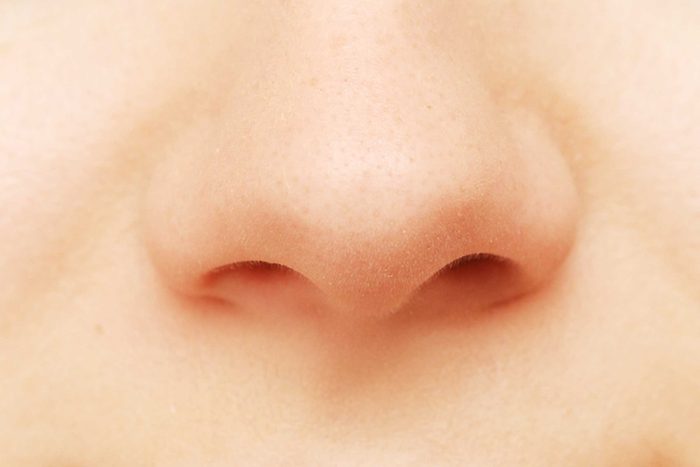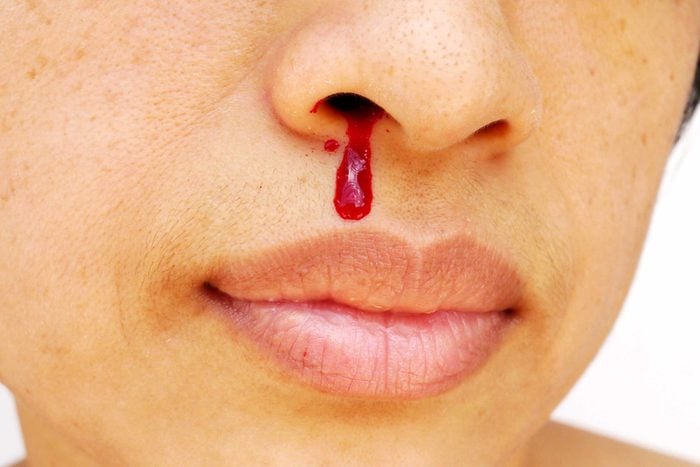
Dry nasal passages
Stemming a flood from your nose can be embarrassing and inconvenient. If you’ve ever wondered what causes nosebleeds, Josef Shargorodsky, MD, rhinologist at Coastal Ear, Nose & Throat NJ, says one of the most common reasons for a nosebleed is dry nasal passages. Central heating or air conditioning can cause the inside of the nose to dry out. Dry and dusty regions can have the same effect.
Dry nasal passages crust over, and when you remove that cover by blowing your nose—or sticking your finger in there (don’t do it—picking carries other risks too!)—bleeding can result.
Try using a humidifier and drink plenty of fluids to help prevent nasal passages from drying out. If you need a little extra help, Dr. Shargorodsky recommends using an OTC saline nasal spray or antibiotic cream from your pharmacist, to keep the inside of your nose moist. Don’t miss these other home remedies for a stuffy nose.

A blow to the nose
Not too surprising, but even a glancing blow will trigger nosebleeds, as any football, basketball, soccer, or baseball player can tell you. Blood vessels can get damaged, making them bleed. Facial trauma can also cause swelling and bruising, so if the bleeding is significant, or your nose keeps gushing, always seek medical advice in case the damage is worse than it looks, warns Dr. Shargorodsky.

Colds and seasonal allergies
Colds and seasonal allergies create swollen nasal passages and a build-up of mucus in the nose. This is what causes that “stuffed up” feeling we know so well. But repeated and vigorous efforts to blow this gunk out can tear the tiny blood vessels in the nose and start your nose gushing. Prevention is the best cure, so try and limit the effect of allergies by trying these natural remedies and avoid repeatedly blowing your nose.

Hereditary conditions
Some hereditary conditions can cause abnormal growth of blood vessels, including those in the nose. Frequent nosebleeds are a symptom of conditions such as hereditary hemorrhagic telangiectasia (HHT), so if you have frequent nosebleeds, check with your doctor to rule such causes out.
Chronic conditions can affect the blood’s ability to clot, and they can turn a small nosebleed (one that you might not even notice) into a major event. Hemophilia is famously known for bleeding issues.

Prescription medication
What causes nosebleeds? Blood-thinning medication, such as aspirin and warfarin to treat heart conditions or strokes, can make a small nosebleed much more severe. If you’re on medication that could make a nosebleed worse, be sure to seek medical advice promptly should your nose begin to bleed.

Growths in the nose
Weird growths can occur in the nose, including polyps (non-cancerous lumps), lesions, and tumors. Although nasal tumors are rare, they can cause bleeding, especially if they’re accompanied by a blockage or stuffy sensation. Frequent nosebleeds in adults should always be checked out by a specialist to eliminate anything nasty. Find out the dangerous reason you should definitely not pick your nose.

Recognize the danger
What causes nosebleeds can actually be less important than the kind of nosebleed.
“There are a couple of varieties of nosebleed,” says Dr. Shargorodsky. “One thing that matters is the location of the nosebleed. Some nosebleeds are from the front of the nose and some from the back of the nose. The ones from the front are usually the ones that drip forward.”
Bleeding from trauma or dry nasal passages usually occurs at the front of the nose. This is the most immediately obvious kind of nosebleed, and while it’s inconvenient, it’s rarely very serious unless there’s an underlying issue, such as blood thinners or problems with clotting.
Bleeding from the back of the nose can be more complicated, explains Dr. Shargorodsky: “The ones from the back of the nose sometimes cause more swallowing and spitting up blood, rather than dripping.
“The ones from the back often tend to be more severe,” he adds. “The back is where the big blood vessels sit. There are lots of little blood vessels in the front, but the bigger ones are mostly in the back. So spitting up bigger blood clots, and just a higher volume of blood swallow often suggests that it’s coming from the back.” Nosebleeds from the back should be treated in the ER.

How to treat a nosebleed
Everyone recommends tipping the head back—but that can lead to swallowing blood, and perhaps even cause choking. It’s a typical mistake and just one of several common first-aid misconceptions.
“Just pinching the nose at the front is a good first step,” recommends Dr. Shargorodsky, “Usually if it’s at the front, that will stop it.”
Sitting up straight may also help. Dr. Shargorodsky explains that “Sitting upright can potentially decrease the blood flow to the nose a little bit, so being upright actually helps calm things down.” It helps to know how to treat a nosebleed so you can act promptly when one occurs.
But severe, prolonged, or chronic nosebleeds can be a sign of something more serious, so Dr. Shargorodsky has very clear advice: “For nosebleeds that aren’t stopping, or keep happening over and over, it’s important to see a doctor.” Next, find out the scientific explanations behind 22 quirky body reactions.
